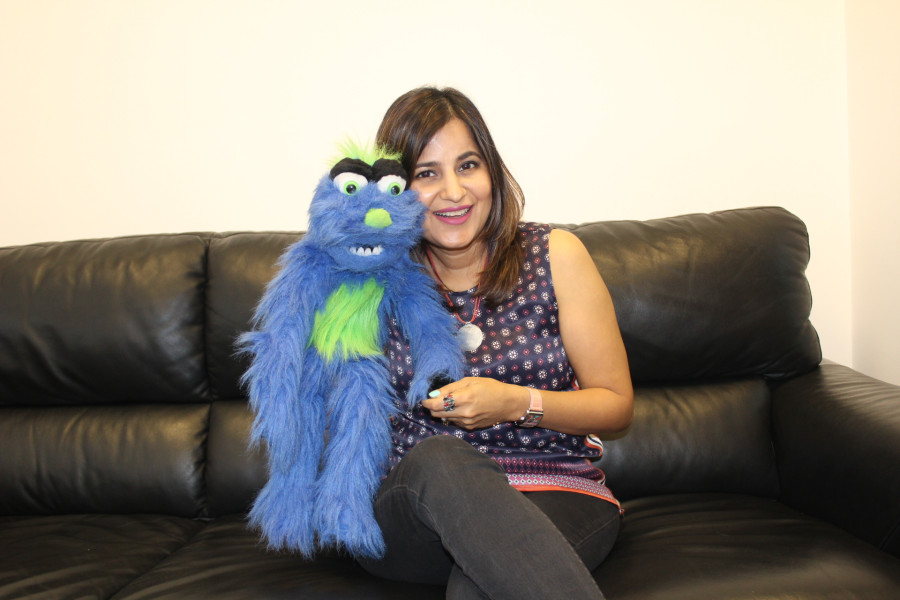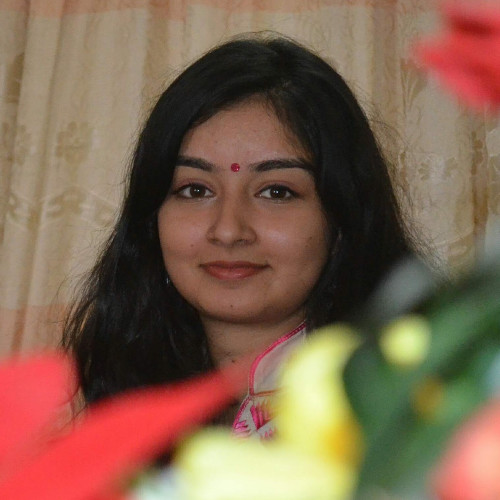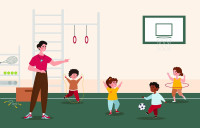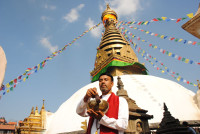Life & Style
She’s got jokes. Or is it the puppet?
Ventriloquism wasn’t always what Seema Golchha wanted to do with her life—one day, she simply took up the art out of sheer interest
Arya Mainali
Seema Golchha’s puppet Jack Denials, a fuzzy-haired creature all in blue, is funny, irreverent and sometimes rude. Though he exists primarily on Golchha’s right arm, he seems to have a life of his own, carrying on a repartee with Golchha. Jack Denials’ lively existence has a lot to do with the fact that he appears to ‘talk’, all by himself.
Golchha is possibly Nepal’s first ventriloquist, a form of stage art where a puppeteer ‘throws’ their voice into the puppet, making it seem as if the inanimate object can talk independently. A good ventriloquist makes the puppet appear alive, talking in a different voice and accent, and crucially, not moving their lips while doing it.
Golchha is good at what she does, as the numerous videos of her performing on stage attest. Her banter with Jack Denials entertains the audience in a way not dissimilar to what stand-up comics do. But ventriloquism wasn’t always what Golchha wanted to do with her life—one day, she simply took up the art out of sheer interest.
Born and raised in Mumbai, India, Golchha had always imagined her life would be invested in her home as a mother and wife. Almost 25 years ago, when Golchha got married right out of college to Sanjay Golchha, a Nepali, she embarked upon a new journey, moving to a new country and settling into the house of a man she had only met for a short while.
“My life as a housewife was not boring,” said Golchha. “It was interesting in its own way. But I as a person, as an individual, never existed.”
Golchha decided to join the Everest Toastmasters Club, an international non-profit that teaches public speaking and leadership skills, at a friend’s persistence. She didn’t think she required any public speaking skills in her life, but for some reason, she stayed.
Golchha got an opportunity to go up on stage when she was called upon to perform a comedy skit for the club’s public outreach programme. She managed to successfully complete her short skit, without panicking and ruining the set. This led her to realise that performing on stage was something she could do, and so, Golchha decided to try something new.
Living in a joint family, Golchha always had a ready audience of five or six children at home. Every night after dinner, she would sit the children down and tell them jokes using small hand puppets.
“I would tell stories using puppets to my kids at home,” Golchha said. “I started doing ventriloquism professionally thinking I’d either create history or be history.”
Golchha performed her first ventriloquism show for the Jain Mahila Mandal using small hand puppets who spoke in Hindi. That was when she realised this was something she was actually good at. She decided to take it up to Toastmasters and ordered a bigger puppet for her future shows.
It was in 2011 that Golchha performed her first show in front of a crowd. For her first big show, Golchha performed stand up and ventriloquism in a cafe in Jawalakhel, which she and a few other members of Toastmasters had put together. In order to ease the audience into their act, she wrote her own script and cracked a few jokes to introduce the audience to a new form of comedy.
Until then Golchha was unsure about potential avenues to explore her ventriloquism skills, but she says she found her calling after the big event. The more she performed, the more she wanted to do it again.
“It was like a superpower—to make people laugh,” Golchha said.
Golchha continued performing ventriloquism occasionally through Toastmasters for a while. In March 2016, Golchha performed in an all-women comedy show in Kathmandu. Following the success of the show, she performed in three more shows organised by Stand Up Comedy Kathmandu before venturing out to Mumbai and Gurgaon.
In 2017, Golchha was performing regularly at Canvas Laugh Club in Gurgaon and Mumbai with her 20-minute sets.
When asked if she has always been a comedian all her life, Golcha said, “With my friends, I have always been fun. But I never thought I’d take up comedy as a career.”
Anyone who has watched Golchha perform live or her videos on YouTube knows that her puppets are upfront, sometimes bordering impudent. Golchha says the puppets bring out her inner child, but do not necessarily represent her personality. Coming from a family where she has always maintained an image and profile, her ‘bratty’ puppets are an extension of her character but not her true self.
“My puppets have called people ugly or told them to get out,” Golchha said. “But I tell them to say sorry so that balances us out on stage.”
After every show, Golchha gets questioned if her puppets’ voices are pre-recorded, which she takes as a compliment. For a ventriloquist, the audience believing the puppet has a voice of its own and is not being voiced by the human on the stage is a sign of a successful show.
Irrespective of the number of shows she has done, Golchha still gets nervous before going up on stage. Her biggest fear—collapsing on stage.
“There are a lot of people who’ve told me my puppets are far more confident than me and it’s funny because it is me,” she said.
When she was recently in the US, to perform at the Gotham Comedy Club through Canvas, Golchha took improv classes to improve her art in ventriloquism. Now, she does improv workshops in Kathmandu to help local comedians like her who want to take a step further with their careers.
“It is kind of soul-crushing when you don’t get the reaction you wanted from your audience but you have to be at it and keep practising,” Golchha said. Keeping at it, after all, is what matters.




 13.26°C Kathmandu
13.26°C Kathmandu










